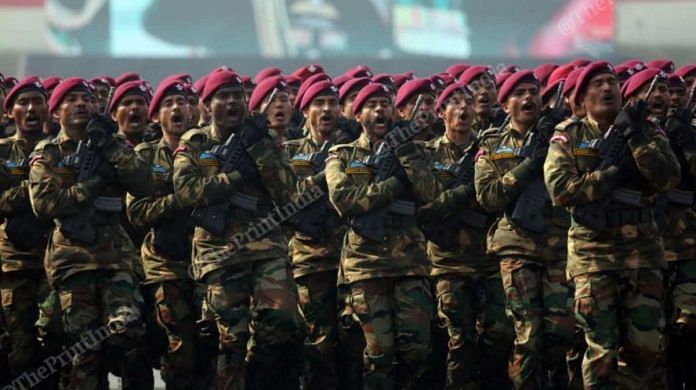New Delhi: The central government has moved the Supreme Court, saying its judgment decriminalising adultery should not apply to armed forces.
The Union Defence Ministry was referring to a September 2018 judgment, where a five-judge Constitution bench led by the then Chief Justice of India Dipak Misra scrapped Section 497 of the Indian Penal Code (IPC) that defined adultery as a criminal offence. The court had ruled at the time that the 19th century law “treats a husband as the master” and violated constitutional rights such as equality and privacy.
The ministry, in a plea it described as a “clarification application”, said the judgment “may cause instability” within the applicant’s services.
The application, which the government said was “bonafide” and filed “in the interest of justice”, sought to note that many a time officers are posted at borders or in far-flung areas, forced to stay away from their families. If its plea is not allowed, then the petitioner will suffer “irreparable loss and injury”, the application added.
In view of the judgment, the government submitted, there will always be a “concern in minds of the armed forces personnel”, operating under challenging conditions, about the family “indulging in untoward activity”.
The government also pointed out that, under service rules, personnel can be cashiered from service on ground of “unbecoming conduct” for committing adultery with a colleague’s wife.
The “said provisions under various laws applicable to defence personnel” are protected under Article 33 of the Constitution that allows the government to curtail or abrogate fundamental rights of officers employed with the services, the government said.
“Promiscuous or adulterous act by defence personnel would still be offences for which either criminal or disciplinary action could be initiated under Army Act and other laws proceeding on the basis that these are acts of misconduct,” it added.
Also Read: During Covid-19 lockdown, everything is digital — even adultery
Application to be heard by Constitution bench
A bench led by Justice R.F. Nariman — who was also part of the 2018 bench — took up the application Wednesday and asked Attorney General K.K. Venugopal, appearing for the government in the case, why a clarification was needed.
Venugopal argued that the 2018 judgment did not take into account the Army Act, the Navy Act, and the IAF Act. “In the Army Act, there is a provision where the officer can be court-martialled,” he said.
Venugopal was referring to those sections under laws governing the Army, the Navy and the Air Force that provide for criminal and disciplinary action against officers found to have indulged in “unbecoming conduct”.
In its application, the government said this term would cover a wide “variety of conduct which a member of the forces will be subject to”. However, it was not possible for it to enumerate each and every one of their actions, it added.
“The armed forces act (referring to the Army Act, the Navy Act and the IAF Act) is on a different footing because the expression used is ‘unbecoming conduct’. Something which is not strictly adultery because Section (497 IPC) has been struck down would still be ‘unbecoming conduct’. The person would be liable under that,” Justice Nariman noted orally.
Since the 2018 judgment was rendered by a five-judge bench, Justice Nariman said the clarification should come from a bench of the same strength. The court then went on to issue notice in the matter and referred it to a Constitution bench.
‘Can scrap fundamental rights of armed forces personnel’
Despite the judgment, the Army has continued to act against officers found to have indulged in adulterous relationships.
In August 2019, a bench headed by Justice Nariman had quashed General Court Marshal (GCM) proceedings that found a colonel guilty of adultery. The case involved a decorated colonel serving in Jammu and Kashmir who was accused of having two adulterous encounters with the wife of a retired officer. The Army had initiated proceedings against the officer but he was reinstated by the top court.
In its application, the government asserted the need to retain adultery as a form of misconduct in the forces.
“Discipline is the bedrock of the work culture in defence services and an essential ingredient for combat operations,” it said.
Even the framers of the Constitution had acknowledged the same and authorised Parliament to restrict or scrap certain fundamental rights in their application to armed forces, so as to ensure proper discharge of duties and maintenance of discipline, the government added.
The government went on to give a detailed background on the inclusion of Article 33 in the Constitution that became the basis for it to draft the Army Act and other laws to regulate the forces. This provision, the government argued, would place beyond challenge every single act of misconduct that would come under broad generic heads laid out in the sections that deal with disciplinary action.
Under the service rules, it said, various rights of officers have been curtailed to enforce discipline. This, it maintained, was upheld by the top court in a catena of cases.
“Armed forces exist in an environment wholly different and distinct from civilians. Honour is a sine qua non of the service. Courage, and devotion to duty, even at the risk of one’s lives, is part of the unwritten contract governing the members of the armed forces,” the government said.
Also Read: Adultery may not be cause of unhappy marriage, can be result: Quotes from SC’s 497 ruling



